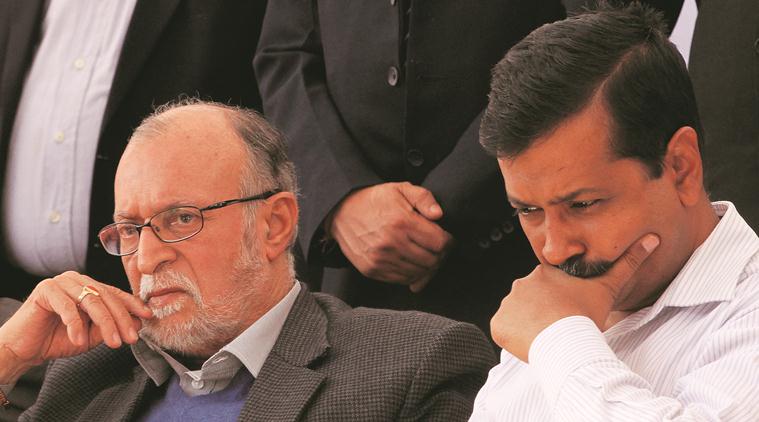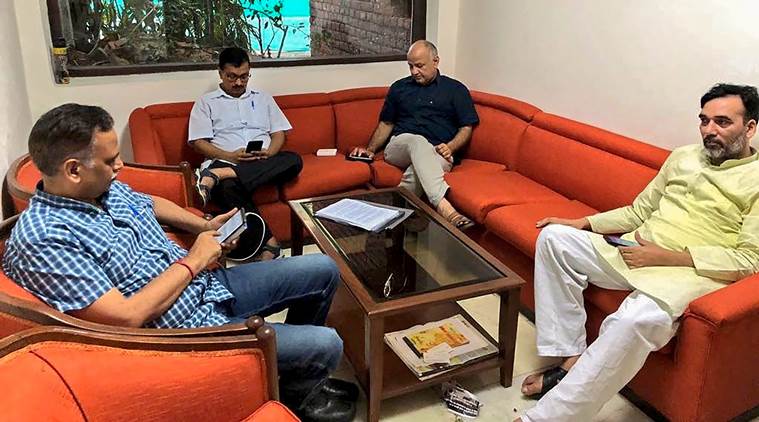
The Supreme Court Thursday delivered a split judgment on regulations of services in the national capital pertaining to the power tussle between the Delhi government and Lieutenant Governor Anil Baijal. The two-judge bench consisting of Justice Ashok Bhushan and Justice AK Sikri disagreed on the jurisdiction of Centre and Delhi government over appointment and transfer of bureaucrats in Delhi, but ruled unanimously that the Anti-Corruption Bureau will remain under the Centre’s control.
Follow AAP vs L-G power tussle LIVE Updates
Main points
1) The issues pertain to the clash between the Delhi government and the Lieutenant Governor over control of services, setting up of a Commission of Inquiry and the power of the Anti-Corruption Bureau.
2) The executive power of the Centre over the National Capital Territory (NCT) of Delhi is “confined to three matters”: public order, police and land.
3) Justice AK Sikri held that the transfer of Joint Secretary-rank and higher officials will remain the domain of the Lieutenant Governor, while other officers fall under the Delhi government. However, in case of a difference of opinion, the view of the L-G will prevail. Both judges were in agreement that the Anti-Corruption Bureau (ACB) will come under the L-G—a decision that will not go down well with AAP government.

4) Since there is a difference of opinion between the two judges, a larger Supreme Court bench will take a call on who will have the final say on the transfer and appointment of bureaucrats in Delhi. The bench will decide whether the Delhi government or Lieutenant Governor should have jurisdiction over ‘Services’ in Delhi. While the Centre has taken the stand that the L-G has the power to regulate services in Delhi, the AAP government has opposed it.
5) The Delhi Government has powers to appoint special public prosecutors, and directors under the Electricity Act, the court said. It is also entitled to charge revenue on agricultural land, the court ruled. Justice Sikri held that Government of National Capital Territory of Delhi (GNCTD) can appoint public prosecutors.
6) The Supreme Court unanimously ruled that the Centre has the power to set up Inquiry Commission.
7) According to the verdict, the Centre, vis-a-vis the L-G, has the power over four matters, including the setting up of Inquiry Commission and the Anti-corruption Bureau. The Centre will have jurisprudence over the appropriate govt under the Commission of Enquiry Act and on posting and transfer of Grade 1 and Grade 2 officers.
8) The Delhi government, the court ruled, will have the power to appoint special public prosecutor and directors under the Electricity Act. The government also has the power to revise minimum rates of agricultural land, but the LG has the right to refer it to the President.
9) In July 2018, a five-judge Constitution bench of the court had laid down broad parameters for governing the national capital, which has witnessed a turf battle between the Centre and the Kejriwal government. The court ruled that Delhi cannot be accorded the status of a state. It also said the L-G had no “independent decision-making power” and must act on the aid and advice of the elected government.
10) The Centre had later told the apex court that the administration of Delhi cannot be left to the Delhi government alone and emphasised that it has an “extraordinary” position by virtue of Delhi being the country’s capital.